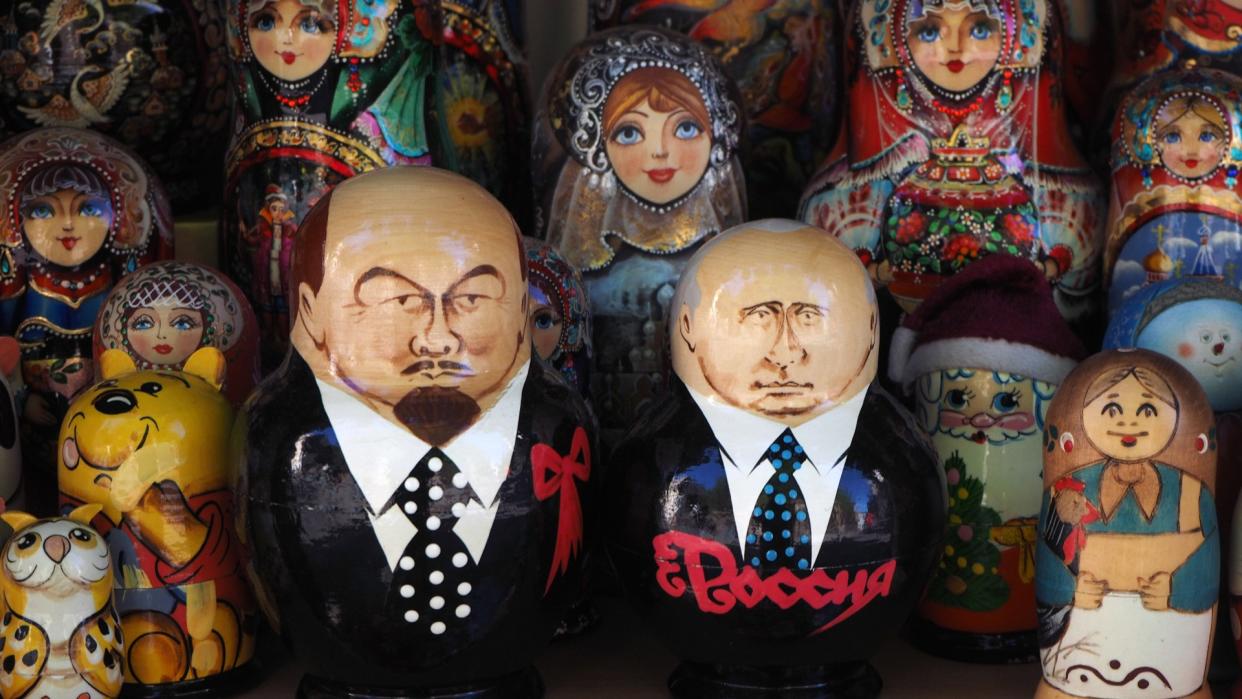Goodbye Lenin? How Russian revolutionary haunts Vladimir Putin 100 years on

- Oops!Something went wrong.Please try again later.
- Oops!Something went wrong.Please try again later.
The centenary of Vladimir Lenin's death on Sunday is expected to be met with silence from the current occupant of the Kremlin.
Russian president Vladimir Putin "cares about history", said Ishaan Tharoor in the The Washington Post. He has "spent a great chunk of his time in power self-consciously cloaking his rule in the mantle of far earlier Russian eminences", linking his invasion of Ukraine to campaigns waged there by empire-building czar Peter the Great more than 300 years ago.
But Putin's views on Lenin, the Bolshevik leader and founding father of Soviet Russia, are complicated and contradictory. Putin "loathes Lenin and Trotsky" as the architects of the 1917 revolution and Soviet Russia, said historian Michael Burleigh on the i news site.
He has increasingly denounced Lenin as a state destroyer and, since the invasion in 2022, labelled him the "creator and architect" of modern Ukrainian nationhood. But Putin, born in Leningrad in the midst of the Soviet era, has repeatedly called the collapse of Soviet Russia a "historical catastrophe".
What has Putin said about Lenin?
Putin may lionise Russia's historical autocrats, looking to emulate them as a pious and powerful modern-day tsar. But that picture has "one glaring flaw, and it's plainly visible at the heart of Russia", said Steve Gutterman on Radio Free Europe in 2017. That is the embalmed corpse of Vladimir Lenin, lying in a "squat stone mausoleum just outside the Kremlin walls".
Lenin "was the creator of the first totalitarian state and he oversaw the state-sanctioned mass murder of those he regarded as politically undesirable", wrote Celine Etheridge in The New European. "His body is still on display in Moscow today, an object of veneration in Vladimir Putin’s Russia."
In 2016, Putin broke with custom and denounced both the revered Bolshevik leader and his government for their brutal repressions. He accused Lenin of planting a "time bomb" beneath the state.
At the same time, Putin has shied away from publicly removing Lenin's body from Red Square despite popular support for such a move, amid "concern about offending those who feel nostalgia for the Soviet era", said Gutterman.
When discussing the 1917 revolution, and subsequent arguments between Stalin and Lenin about how the USSR should be formed, "Stalin is the good guy" in Putin's version of history, said Latvian journalist Kristaps Andrejsons on Foreign Policy.
For Putin, who fears instability above anything else, Lenin as the personification of the revolutionary change represents the existential threat to his rule.
How has Lenin affected Putin's decisions over Ukraine?
Putin has also sought to use Lenin as justification for Russia's invasion of Ukraine in February 2022.
He dismissed the notion of Ukrainian sovereignty as a creation of Lenin and the Bolsheviks, wrote Dr Björn Alexander Düben, from Jilin University in China, in The Daily Telegraph in 2022.
Putin claimed that Lenin created Ukraine by "separating, severing what is historically Russian land".
But history has a habit of repeating itself, and there is an "underappreciated comparison" between Russia's invasion of Ukraine and the Red Army's invasion of Poland in 1920 under Lenin, wrote Peter Whitewood, from York St John University, on The Conversation.
The Bolsheviks "framed this conflict in strikingly similar terms to the conspiracies running through Russian propaganda today", said Whitewood.
Putin's rhetoric "echoes Russian propaganda of an older Soviet worldview", including the exaggeration of "interventionist blocs encircling Russia while refusing to recognise the agency of Ukraine – precisely how Lenin once saw Poland". These echoes are "hard to ignore".
During last year's aborted coup by the Wagner mercenary group, led by the now deceased Yevgeniy Prigozhin, Putin drew comparisons to the crisis that saw the Russian empire slide out of the First World War and into the full throes of the Bolshevik Revolution.
But analysts "pointed to the inaccuracies of the potted history put forward by Putin", said Tharoor in The Washington Post. It wasn't "internal strife" that led to the revolution, but losses during the war that that undermined the legitimacy of the czarist government.
"It is apt that Putin referenced the events of 1917 in his denunciation of Wagner's actions," wrote Jack Watling, from the British think tank the Royal United Services Institute. The "deterioration of the Russian Army in 1917 saw numerous mutinies, negotiations and fragmentation within the Russian command". The collapse, Watling wrote, "started at the front".
Considering the Russian army's well publicised losses in Ukraine, "the lessons from the past seem quite clear", said Tharoor.
A century on from his death, Lenin still casts a long shadow over Russia, and especially over the man who has spent much of his life trying – and failing – to bury his legacy.

